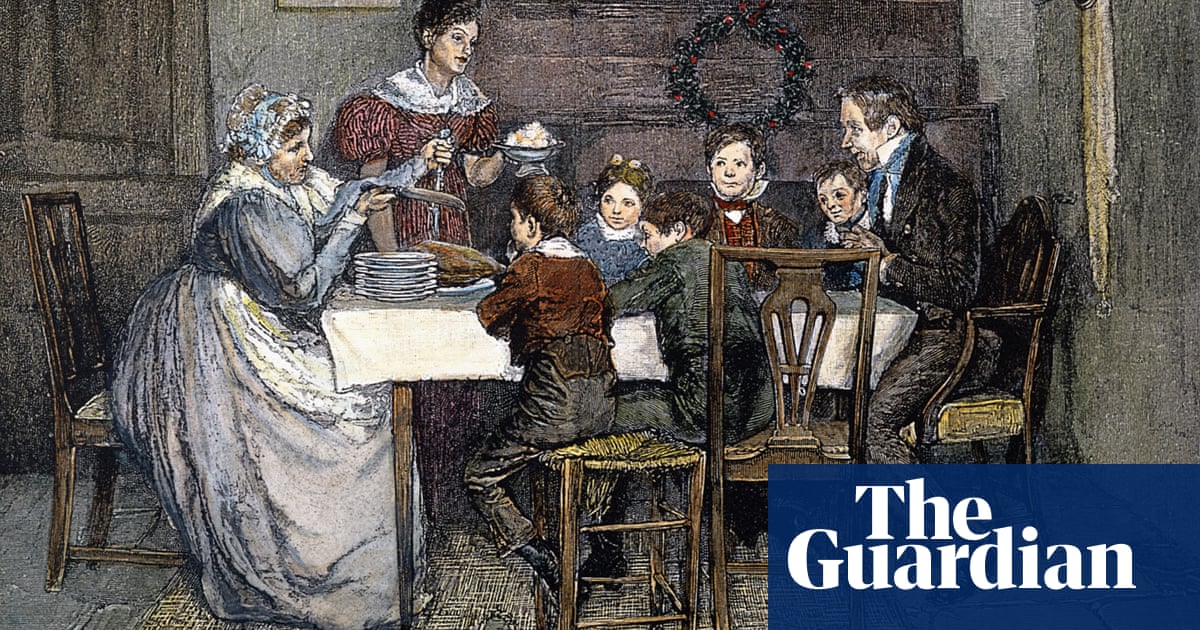A Christmas Carol is not cosy, and its angry message should still haunt us - 4 minutes read

Bob Cratchit's Christmas Dinner, after a drawing by Edwin Austin Abbey for A Christmas Carol. Photograph: The Granger Collection/Alamy Charles Dickens A Christmas Carol is not cosy, and its angry message should still haunt us Dickens’s novella has become a festive staple but it was intended as a polemic about the treatment of the poor
‘I have endeavoured in this Ghostly little book, to raise the Ghost of an Idea,” begins Charles Dickens in the preface to the 1843 novella A Christmas Carol. It is a story so inescapable in British culture that nearly everyone knows about miserly Ebenezer Scrooge learning the value of compassion and kindness after being visited by three ghosts in the early hours of Christmas morning.
While many people enjoy the story as a timeless tale of redemption, few think of it as a work of serious political activism, but that was Dickens’s intention.
According to Michael Slater, a biographer of the Victorian author, A Christmas Carol is “Dickens’s reaction to the attitude of the government and many of the ruling classes in the 1840s … saying, if the poor couldn’t get work and couldn’t look after themselves, they’d have to go to the workhouses.”
This belief was part of a prevailing attitude in Victorian society that the poor were a problem to be dealt with, instead of people to be helped – a belief Dickens vehemently disagreed with.
Dickens’s politics were shaped by his own childhood experiences. When his family fell on hard times, he was briefly taken out of school and sent to work in a factory.
Early in A Christmas Carol, for example, when a charity collector tells Scrooge that many people would rather die than go to a workhouse, Scrooge replies: “If they would rather die, they had better do it, and decrease the surplus population.”
“It’s the idea that if a man is born into this world, and his parents can’t look after him, and he can’t look after himself, he is ‘surplus’ … and the sooner he dies, the better,” Slater says.
“People were terrified of overpopulation, especially among the poor, and they believed that if people brought children into the world that they couldn’t afford to keep, they were almost committing a crime. This is what Dickens hated, this attitude.”
It was an attitude that stemmed from the work of well-known political economists such as Adam Smith, who believed that if everyone acted in their own self-interest, the invisible hand of the market would distribute resources.
And taking this idea further was Reverend Thomas Malthus, who in 1798 wrote the controversial book An Essay on the Principle of Population. In it, he argued that population growth would eventually outstrip the food available and it was the natural way of things that the poorest people would starve to death, restoring the balance.
“Malthus doesn’t tend to use the term ‘surplus population’ but by the early 1840s, when Dickens uses it there, that term is firmly linked to Malthus’s name. I absolutely think people would tie that comment from Scrooge to Malthus fairly directly,” says Professor Robert Mayhew, the author of several books about Malthus.
Later in the story, the phrase “surplus population” is used again, this time by the Ghost of Christmas Present. When Scrooge sees the Cratchit family gathering around Tiny Tim and asks if the boy will live, the spirit invites him to think about “what the surplus is and where it is”, suggesting Scrooge might be more surplus than the sick child.
“A Christmas Carol isn’t just a cheery, uplifting tale that we can mimic in various modern ways,” says Mayhew. “It’s a very seriously intended work of moral fiction and, perhaps because we tend to pigeonhole it as a Christmas story, we don’t read just how serious it is.”
“It’s interesting because we’re living right now with unprecedented levels of homelessness and individuals needing the support of food banks. We have the binary between extreme wealth on one hand and those inured to poverty on the other.” You feel the resonance of A Christmas Carol seems to get stronger every year.”
Source: The Guardian
Powered by NewsAPI.org